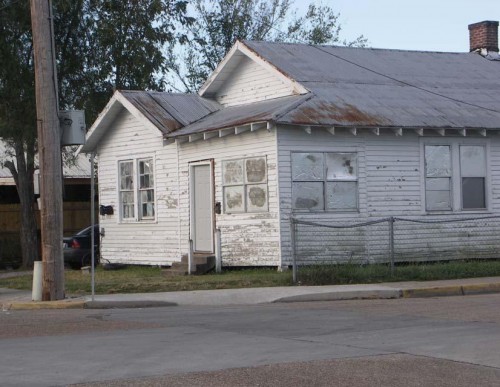Tuesday, Nov. 16
November 16, 2010
Neighbors angered over blight
November 18, 2010A committee formed to evaluate prospective sites for a cold storage facility in Terrebonne Parish was caught in a dispute over language at the Terrebonne Economic Development Authority meeting last Tuesday, before board members decided to send the matter on to consultant Duplantis Design Group for cost comparisons and due diligence.
The much-anticipated report offered an evaluation of seven property tracts submitted for consideration by four parties: the Houma-Terrebonne Airport Commission, the Terrebonne Port Commission, Richard Development and Cropland Investment Group.
At issue was a misunderstanding among committee members as to their purpose in reviewing and grading the properties involved.
While some members claimed their purpose was to simply evaluate the represented tracts so the full TEDA board could make a decision based on their findings, others suggested that there was an effort to at least imply a committee recommendation based on the final grades for each piece of property, upon which the full board would have to take on the ultimate decision-making responsibility.
TEDA board member Morris Hebert chaired the committee and explained to peers a criteria-grading method used to establish their results. The system offered 90 available points based on a series of requirements.
Cropland Investment Group secured the lead positions with 86 and 85 points respectively for two tracts it had submitted for consideration. The airport commission properties took the 3rd, 6th and 7th spots with grades of 81, 71 and 57. The port commission was listed with the 4th highest grade at 79. A site offered by Richard Development filled the 5th place spot with 78 points.
Committee and board member Brad Doyle was vocal regarding his questions on how the grading went and if the report was or was not offering a property recommendation to the full board.
Doyle read a section of committee minutes from a meeting on Nov. 4 and objected to the implication that any specific recommendation was being offered to the board based on the highest points presented.
“I thought, and it was my understanding, that this was going to be illustrative, but there wasn’t going to be any recommendation unless we voted on the recommendation. The committee itself made no vote and no recommendation as far as I know as to the property that we would like the full board to consider, and the number of properties we would like the full board to consider,” he said.
Doyle said his objections were based on a final paragraph of the committee report, which read that the committee “recommends” that TEDA move forward to the next phase by offering studies in regard to the top three graded positions.
“[We] did not decide, at least to my knowledge as to the recommendations of [the top three] tracts. Which means, in my opinion, and I can only go by what I am reading, which means that the port commission, the development of HTAC tracts 2 and 3, [were] not even being considered by the board. So, what I’m saying [is], to my knowledge that’s not the recommendation that was voted on by the committee,” Doyle said.
Some committee members insisted the report was just a suggestion for the board to look at the properties with the top three grades. Others said the grades reflect only a level of appropriateness and their positioning has no bearing on what committee members might or might not think is a best location for the cold storage facility.
“Brad is right. No vote was taken [to recommend specific properties]. Our mission, as I saw it, was to put together data,” said committee and board member Darrin Guidry.
Hebert said that the disagreement appeared to be over wording. “This needs to be looked at as what is best for TEDA,” he said.
In the end, the board sent the cold storage location evaluation on to its consultant to look into costs associated with getting any of the three top graded properties ready for use and details associated with pre-construction efforts.
Outside the board meeting, Doyle said for him it was a matter of process and procedure. “I don’t think we should use those top three that were superior to the others. We should do a study on at least the top five,” he said.
Doyle did not imply that he had any site preference from the tracts that had been presented in the committee’s report.
During a public comment portion of the board meeting, both developers Ron Shaw of Cropland Investment Group and Henry Richard of Richard Development made final pushes in an effort to sell their sites.
“I didn’t have an opportunity to explain the property better,” Richard told the board. He referred to his proposed tract as a “sleeping giant” of opportunity and commented outside the meeting that he thinks board members should rethink the sites and believes that he will receive a call after they have reviewed the three highest graded tracts.
Airport Director David Slayter was unable to attend the TEDA meeting due to jury duty, but away from the session said he respects TEDA going through the process to make sure they get what is best for the area. “[The cold storage location issue going to the consultant for evaluation] will allow them to maybe get another perspective on what type of site they are looking for and what will best meet their needs,” he said.
Board members said that they would like to see Duplantis come back with some direction beyond raw data.









